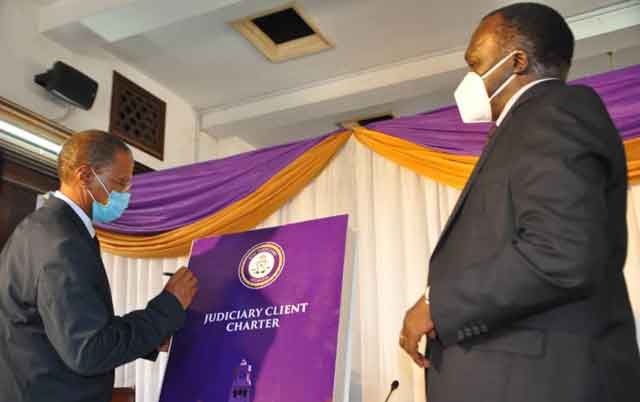
Kampala, Uganda | THE INDEPENDENT | The Chief Justice Alfonse Owiny-Dollo has unveiled the Judiciary client charter and two workplace policies.
The HIV/AIDS workplace and Anti -Sexual Harassment policies are aimed at providing a safe and convenient working environment for the court users and judicial officers.
They also put in place tough consequences for any judicial official found engaging in acts of sexual harassment.
Speaking at the launch of the policies on Wednesday, the Chief Justice Owiny-Dollo said the policies shall enable the Judiciary in taking major steps towards building public trust in the institution as well as ensuring that there is maximum respect and prioritizing access to Justice at all points of service.
On the client charter, Owiny-Dollo said it’s a commitment for the Judiciary to uphold professionalism, transparency, accountability, equality and independence while dealing with the court users.
The Charter signed by retired Chief Justice Bart Katureebe enhances the Judiciary’s commitments as an institution to carry out its mandate without discrimination. It also presents service standards expected of judicial officers and obligations of the court users, their commitments, accountability, complaints and appeal channels and feedback procedures if anyone is aggrieved with their working mechanisms.
Owiny-Dollo emphasized that the Judiciary is committed to upholding the constitutional principles such as Justice which shall not be delayed and awarding adequate compensation to victims of wrongs, promoting reconciliation between parties and administering substantial Justice.
The Judiciary’s Permanent Secretary Pius Bigirimana said that with the policies and charter in place, the public should hold the Judiciary accountable. He added that this was the right time to launch the policy given the huge numbers of sexual harassment cases reported by judicial staff.
The launch of the policies comes at the time when several judicial officers have been accused of sexual harassment.
In 2015, the Mbarara Grade One Magistrate, Opio Belmos Ogwang was interdicted on sexual harassment allegations. The then Chief Registrar Paul Gadenya Wolimbwa interdicted Opio following a complaint of sexual harassment lodged against him by a former female clerk at Kyenjonjo Chief Magistrates Court.
In 2018, during a performance management workshop for judicial officers for Kampala and Luweero high court circuits, the officers complained that they are sexually harassed by their immediate bosses while executing their duties.
The Judicial Service Commission (JSC) also opened up a general inquiry file into allegations of sexual harassment of female judicial officers by their bosses.
In 2019, Samantha Mwesigye , a Senior State Attorney accused Christopher Gashirabake, the Director of Legal Affairs in the Justice and Constitutional Affairs Ministry of subjecting her to sexual harassment for over 10 years.
The Charter also provides for improvement on the efficiency and effectiveness of the courts and streamlining the administration of the courts to enable a judicial process that is committed to expeditious resolution of disputes.
********
URN
 The Independent Uganda: You get the Truth we Pay the Price
The Independent Uganda: You get the Truth we Pay the Price



